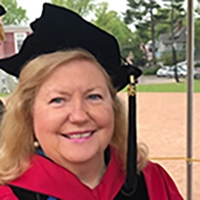Sports Communication
Through a series of media studies courses, students learn about the functions and influences of the media, so they enter the profession with an awareness of the cultural impact their work will have, as well as associated social and ethical issues regarding the roles and functions of the media in our society.
In addition, consistent with Lasell's connected learning philosophy of education, communication majors will gain hands-on experience in and outside of the classroom throughout their four years of studies. There are numerous opportunities to work on class projects at our state-of-the-art Lasell College Radio station, in programming, production, and promotions, in our high-tech multimedia lab, as well as the studios of NewTV, Newton's community-access cable television located just three miles from the Lasell campus. Students interested in print media can become involved in the 1851 Chronicle student newspaper or the award-winning campus fashion magazine, Polished. Required courses like Human Communication include a service-learning component to connect students with organizations in the real world.
The communication major culminates in a capstone course in Media Literacy and a required professional internship. Lasell is ideally located for internship opportunities at some of the most prestigious media outlets and organizations in the country, such as The Greater Boston Radio Group, Community Newspapers, Boston Celtics, New England Patriots, Boston Herald, ABC5-TV, FOX25, WMJX-FM (MAGIC 106.7), and the Arnold Worldwide advertising agency. Students gain valuable professional experience and significant contacts through internships and professional mentoring within the communication industry.
Upon graduation, students are well-prepared to pursue careers in the growing and exciting fields of communication from journalism, public relations and advertising to television, radio production and interactive multimedia. Graduates receive a Bachelor of Arts degree in Communication (with a concentration of their choice). The department also offers minors in Communication and Sports Communication. The Communication Department offers a Master of Science with three areas of concentration: Health Communication, Integrated Marketing Communication, and Public Relations. The Graduate Program is described elsewhere in the catalog.
The Academic Standard for Communication majors is: Students must earn a grade of C or above in each of the following core courses that are Major Requirements:
COM 101 Understanding Mass Media 3
COM 103 Introduction to Human Communication 3
COM 105 Writing for the Media 3
COM 203 Effective Speaking 3
COM 205 Media Ethics and Society AI (ME) 3
COM 212 Intercultural Communication AI (MC) 3
COM 315 Communication Research 3
COM 399 Internship Seminar 1
COM 400 Field Experience (capstone course) 4
COM 418 Media Literacy (capstone course) 3
Failure to receive a minimum grade of C in any one of these courses will result in the student having to repeat the course.
The following goals and associated learning outcomes delineate what we strive for students to achieve when they complete the major program of study in Communication:
Goal 1: Effective Writing
Upon completion of the major program of study in Communication, students will be able to
- Articulate their thoughts clearly in written form
- Write in the style demanded of their chosen profession
Goal 2: Effective Speaking
Upon completion of the major program of study in Communication, students will be able to
- Demonstrate effective verbal and non-verbal communication skills in professional presentations
Goal 3: Visual Articulation
Upon completion of the major program of study in Communication, students will be able to
- Demonstrate currency with technical media
- Demonstrate their own personal aesthetic
Goal 4: Research
Upon completion of the major program of study in Communication, students will be able to
- Find information to support a thesis
- Conduct an argument that advances a thesis
Goal 5: Knowledge of Media
Upon completion of the major program of study in Communication, students will be able to
- Define the functions of media
- Explain the influences of media in society
- Identify the ethical decisions and issues in the Communication field
Additional Requirements: 9 credits
Choose one additional COM or SMGT course: 3 credits
Any 200-level ENG course: 3 credits
Additional Social Science Elective (SOC, PSYC, POLS, etc.): 3 credits
Communication students who have not declared a Concentration must complete all of the courses for the Major Requirements (29 credits), and ten (10) courses selected from the lists of courses under the Concentrations (30 credits).
Courses listed below fulfill Area of Inquiry requirements:
Moral and Ethical
COM 205: Media Ethics and Society
SMGT 202: Ethics in Sport
Multicultural
COM 212: Intercultural Communication
Psychological and Societal
SMGT 101: Sport and Society
General Education Core Requirements and remaining Unrestricted Electives: 55 credits
Minimum credits required for graduation: 120
| Course Code | Course Title | Credits |
|---|---|---|
| Core Courses | ||
| COM101 | Understanding Mass Media | 3 |
| COM103 | Human Communication | 3 |
| COM105 | Writing for The Media | 3 |
| COM203 | Effective Speaking | 3 |
| COM205 | Media Ethics & Society | 3 |
| COM212 | Intercultural Communication | 3 |
| COM315 | Communication Research | 3 |
| COM399 | Internship Seminar | 1 |
| COM400 | Field Experience I | 4 |
| COM418 | Media Literacy | 3 |
| Concentration Courses | ||
| COM208 | Public Relations | 3 |
| COM209 | Journalism | 3 |
| COM215 | Radio Production | 3 |
| COM309 | Sports Communication | 3 |
| SMGT101 | Sport & Society | 3 |
| SMGT102 | Contemporary Sport Management | 3 |
| SMGT202 | Ethics in Sport | 3 |
| SMGT304 | Sports Information & Communication | 3 |
| Com Major AI PS | ||
| CJ101 | Introduction to Criminal Justice | 3 |
| ECON101 | Principles of Econ-Micro | 3 |
| ECON103 | Economics of Social Issues | 3 |
| LS101 | Foundations of American Legal System | 3 |
| POLS101 | American Government | 3 |
| POLS201 | State & Local Government | 3 |
| POLS202 | Issues in Contemporary Political Thought | 3 |
| PSYC101 | Psychological Perspectives | 3 |
Additional Requirements: 9 credits
Choose one additional COM or SMGT course: 3 credits
Any 200-level ENG course: 3 credits
Additional Social Science Elective (SOC, PSYC, POLS, etc.): 3 credits
Communication students who have not declared a Concentration must complete all of the courses for the Major Requirements (29 credits), and ten (10) courses selected from the lists of courses under the Concentrations (30 credits).
Courses listed below fulfill Area of Inquiry requirements:
Moral and Ethical
COM 205: Media Ethics and Society
SMGT 202: Ethics in Sport
Multicultural
COM 212: Intercultural Communication
Psychological and Societal
SMGT 101: Sport and Society
General Education Core Requirements and remaining Unrestricted Electives: 55 credits
Minimum credits required for graduation: 120
ENG208 - The Structure of the English Language
This course focuses on essential elements of the structure of the English language: its phonology (sound structure), morphology (word structure), and syntax (sentence structure). Students draw on their own knowledge of language as they examine spoken English; they then study the relationship between spoken and written language. As students discuss issues pertinent to teachers and to writers, the relevance of linguistic analysis both to written language development and to writing practice is considered. Prerequisite: ENG 102.
ENG209 - Intro to Literature & Literary Studies
This is a foundations course required for the major and the minor in English. The course provides an introduction to a variety of forms and styles in poetry, drama, short story, fiction, memoir, and essay; European, African, North American, Central and South American, and Asian literatures are considered. The focus is on interpreting texts; students are introduced to various schools of interpretation and to standards for supporting an interpretation. Students become familiar with the conventional elements of each genre and with the terminology of critical interpretation. The course introduces print and database tools for research on literature. Prerequisite: ENG 102.
ENG210 - Survey of American Literature
This course surveys representative periods, authors, or genres in American literature from beginnings in Native American oral literatures through contemporary works. Individual sections organize study of classic and contemporary texts around particular themes, such as Queering American Literatures, American Migrations, Hemispheric American Literature, or Americans on the Edge: "Frontiers" in the American Imagination. Individual sections also trace twentieth- or twenty-first-century movements to their roots in or resistance to earlier movements or forms. This is a writing-intensive course. Prerequisite: ENG 102.
ENG218 - British Literature
This course surveys British writing in poetry, fiction, and drama, with a focus on key periods in the development of British literature. Emphasis is on representative writers in each period. Periods and movements surveyed include Anglo-Saxon, Medieval, Renaissance, Restoration and the Eighteenth Century, Romanticism, Victorian, Modern, and Contemporary or Postmodern. This is a writing-intensive course. Prerequisite: ENG 102.
ENG304 - Stories of Origin
This course considers both written and oral traditional texts. Texts originating in expressions of faith, devotion, cultural origin or expression, and ethnic identity are examined, with attention to narration, characterization, sacred mystery, moral /ethical content, and interpretation. Readings include selections from Ancient Greek and Roman literature, the Bible and/or the Qur’an, and world myths and folktales. Prerequisite: Any 200-level English course.
ENG312 - Literature of Postcolonial World
In this course, students consider issues, movements, or traditions in literatures that respond to a history of colonization and/or imperialism. Latin American, African, and Asian cultures or traditions are emphasized in English or in English translations; issues addressed might include matters of publication and criticism, myths about the "third world," nationalism, fundamentalism, human rights, technology, and cultural resistance. Example topics include The Novel in India, Caribbean Dub Poetry, Prison Writing, Major South African Writers, Magic Realism. This is a presentation-intensive course. Prerequisite: Any 200-level English course.
ENG313 - American Multiethnic Literature
This course focuses on the history, variety, and aesthetic conventions of one or more racial-ethnic traditions in American writing. Individual courses might focus on key forms or authors; distinct traditions such as African-American, Latino, Asian-American, or Native American literature; or a survey across several traditions. Examples include Barack Obama and the African-American Tradition, Contemporary Latino Literatures, or Haiti and the US in Haitian-American Writing. This is a writing-intensive course. Prerequisite: Any 200-level English course.
HUM419 - Seminar in Hum: Readings & Research
This capstone course serves as the direct complement to HUM420. Whereas HUM420 is a writing-intensive course, this course is research and reading intensive; students work in a tutorial fashion (i.e., one on one) with the instructor to choose a research topic, read closely in pertinent sources, and report back through informative and exploratory writing assignments and conversations. Like HUM420, this course focuses on the acquisition of knowledge and the solution of problems; when taken together, these courses serve as a capstone experience. Prerequisite: senior standing. Humanities Department and IDS majors only.
HUM420 - Seminar in Humanities
This capstone course focuses on the acquisition of knowledge and problem solving. The topic will change; however, the course emphasizes extensive research projects related to students' fields of interest. This is a writing-intensive course. Prerequisites: HUM419 and senior standing. Humanities Department and IDS majors only.
PSYC221 - Child Development
This course examines the physical, cognitive, linguistic, social, and emotional development of the child from birth to adolescence. The contributions of social and cultural experiences as well as the role of biological factors in development are examined as are major theories of development. Students are introduced to the research approaches used to study human development and may be required to carry out observations in various settings. Prerequisite: PSYC 101.
PSYC223 - Adolescent Psychology
This course provides a survey of contemporary knowledge of the human brain, examining normal developmental brain processes and common brain functions. The course also covers common disorders and emphasizes understanding the impact of atypical brain development and the consequences of brain trauma. Intervention strategies and treatment are included. Prerequisite: PSYC101

Meryl Perlson
Chair of Communication; Professor of Communication
Office: Donahue 107
Email: mperlson@lasell.edu

Brian Wardyga
Professor of Communication; General Manager, 109.2FM WLAS & LCTV
Office: Brennan Library, G04F
Email: bwardyga@lasell.edu

